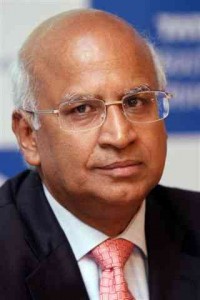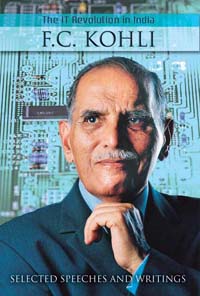Farewell Rama
Received an innocuous mail from TCS today, it was a press meet at their heritage building HQ in Mumbai with the CEO and MD. All seemed like yore till my eyes actually read the name N Chandrasekaran instead of the usual S Ramadorai. In fact, the mind is so accustomed to see his name, that it took a moment to realise that the change of guard that had been in the offing, is finally at hand. Come tomorrow (October 6), the curtains will be down for one of the most illustrious CEOs of India, Subramaniam Ramadorai or S. Ramadorai as he is more universally known. The top-honcho at TCS, the $6 billion IT behemoth, will hand over the baton to his successor N Chandrasekaran (Chandra, is his appellate) and take a back seat as the vice-chairman. The handover is necessitated by the Tata Rule book that states that no individual can continue as a CEO beyond the age of 65. There have been exceptions in the past, but Rama has chosen to follow the rule-book and not take the easy way out. In fact this is one of the most defining traits of Rama as an individual and as a CEO; he never flinches to take a long arduous path if he believes it to be the right one. With a grit that only a few can match up with, Rama will keep working at the goal tirelessly, day in and day out. And yet, except for the few around him not many would realise that this calm serene sexatarian is a workaholic, who even when is calm and serene on the out, is in fact working at a frenzied pace within. Looks can be deceptive, is a phrase that would have been coined for Rama, if it wasn’t before.
It was much this grit and determination that won him the CEO cap at TCS, when the doyen of Indian IT, FC Kohli retired back in 1996. back then, not many knew who exactly Ramadorai was or would have given him much notice, considering the fact that back then TCS was a private company and fairly secretive about its revenues and spread. In those days, for Indians IT meant Infosys or Wipro, or even HCL, but certainly not TCS. And yet, Rama who had joined TCS as a junior engineer in 1972 was destined and determined to change that. He rose through the ranks and eventually was charged with setting up TCS’ operations in the United States in 1979 in New York City, where he got an opportunity to prove his mettle.
Hailing from Nagpur, Rama grew up in Delhi where his father worked with the Indian audits and accounts service department. After studying physics at the University of Delhi, he headed south to Bangalore to study communication technology at the prestigious Indian Institute of Science. After graduating in 1968, Ram briefly joined the Physical Research Lab at Ahmedabad, but soon left to pursue higher studies at the University of California, Los Angeles (UCLA) from where he obtained his masters in computer science.
After completing his education, Rama joined NCR in the US itself briefly before homesickness set in and he yearned to return back. It was at that time that his father told him that the Tata group was looking for ‘people who could work on computers. It was in Nov 1971, that Rama was interviewed by AH Tobaccowala, president, Tata Inc., who was based in New York. Ram was employed with TCS in Bombay on February 23, 1972; the rest as they say is history.
Speaking from a personal perspective, over the years I had numerous chances to interact with Rama. And believe me, till recent past, he was dreaded by the IT journalist fraternity, simply because it is quite impossible to wean out any juicy bit from him. Interviewing him was often a staid experience, as Rama would always stick to sort of a script replying in a low tone, and in as few words as possible. There would hardly be a smile on his face, and he would often seem bored by responding to similar questions.
Yet, there was a perceptible change in him over the last year or so, probably ever since Chandra’s appointment was finalised. Rama seemed much at ease at the conferences and would even smile or quip humorously at a query. It was as if with the weight off his shoulders, he suddenly was enjoying his stint. He even started Facebooking, wherein he started sharing with the world his own perspective on a lot of things. For instance it is from there that one comes to know about his passion for music, walking, golf, cricket and that he likes to read anything – from science & tech to sports, biographies and music. He even went to the extent of sharing his experiences on winning the CBE, considering his shyness is a big big achievement.
Hopefully he won’t really be ‘retiring’ in the real sense of terms, he is currently the Chairman of TATA Technologies Limited, Chairman of CMC Ltd, and Vice Chairman of TATA Elxsi (India) Ltd. He is also the chairman of Computational Research Laboratories Ltd. He is also on the Board of Directors of Hindustan Unilever Ltd, Nicholas Piramal India Ltd, TATA Limited (India), TATA Infotech Limited (India), TATA Internet Services Limited, Nelito Systems Limited, and several other companies. And will also be the Vice Chairman of TCS. In his own words, he will now take on a mentoring role and guide the new CEO at TCS.
Nonetheless, the reticent wise old man of Indian IT will surely be missed, and with his exit a glorious chapter come to an end. Hopefully there are a lot more to come from him; will be keeping an eye on his FB page.
P.S. Hear in his own words what he had to say Chandra and the future of TCS..
Received an innocuous mail from TCS today, it was regarding a press meet at their heritage building HQ in Mumbai with the CEO and MD. All seemed like yore till my eyes actually read the name N Chandrasekaran instead of the usual S Ramadorai. In fact, the mind is so accustomed to see his name, that it took a moment to realise that the change of guard that had been in the offing, is finally at hand.
Come tomorrow (October 6), the curtains will be down for one of the most illustrious CEOs of India, Subramaniam Ramadorai or S. Ramadorai as he is more universally known. The top-honcho at TCS, the $6 billion IT behemoth, will hand over the baton to his successor N Chandrasekaran (Chandra, is his appellate) and take a back seat as the vice-chairman. The handover is necessitated by the Tata Rule book that states that no individual can continue as a CEO beyond the age of 65. There have been exceptions in the past, but Rama has chosen to follow the rule-book and not take the easy way out. In fact this is one of the most defining traits of Rama as an individual and as a CEO; he never flinches to take a long arduous path if he believes it to be the right one. With a grit that only a few can match up with, Rama will keep working at the goal tirelessly, day in and day out. And yet, except for the few around him not many would realise that this calm serene sexatarian is a workaholic, who even when is calm and serene on the out, is in fact working at a frenzied pace within. Looks can be deceptive, is a phrase that would have been coined for Rama, if it wasn’t before.
It was much this grit and determination that won him the CEO cap at TCS, when the doyen of Indian IT, FC Kohli retired back in 1996. Back then, not many knew who exactly Ramadorai was or would have given him much notice, considering the fact that back then TCS was a private company and fairly secretive about its revenues and spread. In those days, for Indians IT meant Infosys or Wipro, or even HCL, but certainly not TCS. And yet, Rama who had joined TCS as a junior engineer in 1972 was destined and determined to change that. He rose through the ranks and eventually was charged with setting up TCS’ operations in the United States in 1979 in New York City, where he got an opportunity to prove his mettle.
Hailing from Nagpur, Rama grew up in Delhi where his father worked with the Indian audits and accounts service department. After studying physics at the University of Delhi, he headed south to Bangalore to study communication technology at the prestigious Indian Institute of Science. Continue reading …
 states that these labels do not affect him, though he adds, “I have received lot of respect from people. What more could I have asked for?”
states that these labels do not affect him, though he adds, “I have received lot of respect from people. What more could I have asked for?”
